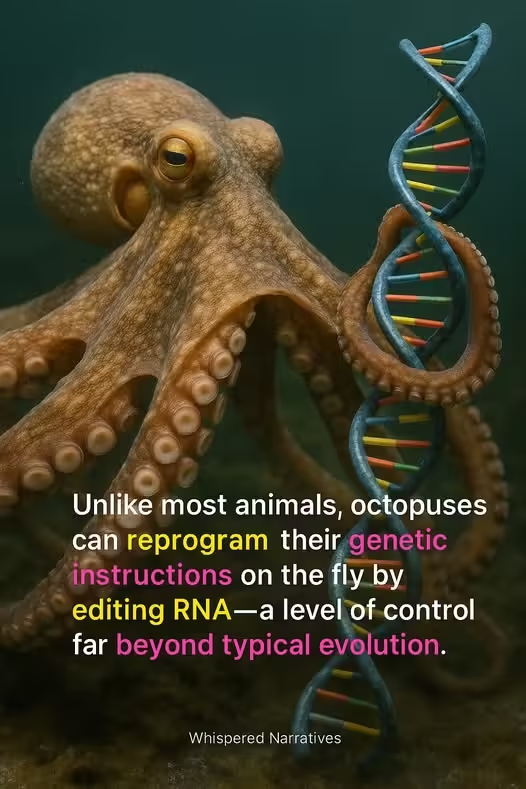Understanding RNA Editing: A Quick Dive into Molecular Biology
To appreciate what octopuses are doing, it helps to understand the basic dogma of molecular biology. Traditionally, we’ve believed that DNA holds the genetic blueprint, RNA is the messenger that carries out DNA’s instructions, and proteins are the final product that determines an organism’s structure and function. Changes or mutations in DNA are how species evolve over time. But this is a relatively slow process.
RNA editing, however, offers a shortcut.
Instead of waiting for permanent changes to DNA through evolution, an organism can tweak the RNA—the immediate messenger—on the fly. Think of it like editing a recipe while you’re cooking, rather than rewriting the cookbook. The most common form of this in animals is adenosine-to-inosine (A-to-I) editing, where enzymes chemically alter specific RNA bases, which in turn can change the function of proteins.
This is where octopuses blow other species out of the water—quite literally.
The Octopus Advantage: RNA Editing in Overdrive
While RNA editing exists in many animals (including humans), it is rare and tightly regulated. In octopuses and their cephalopod cousins—squid and cuttlefish—it’s a whole different story. Researchers have found tens of thousands of editing sites in their RNA, particularly in the nervous system, making it clear that this isn’t some genetic glitch. It’s a highly developed feature.
Why does this matter?
By editing their neural RNA, octopuses can reconfigure their nervous systems on demand. This gives them the ability to adjust brain function and behavior based on environmental conditions such as temperature, threat level, or even emotional state. If the water turns cold, they can modify neuron function to cope with the new conditions—without having to wait generations for genetic mutations to evolve the trait.
This fluidity in neural function could be one reason why octopuses are so intelligent. Unlike most animals, they have distributed intelligence—two-thirds of their neurons are in their arms, not their brains. Each arm can operate semi-independently, solving problems, exploring, even deciding whether to pick up an object or not.
Now imagine being able to edit the “software” of that arm in real-time.
Evolutionary Trade-offs: Why Don’t All Animals Do This?
With such a powerful adaptation mechanism, you might wonder why all animals haven’t evolved to use RNA editing like octopuses. The answer lies in trade-offs.
In vertebrates, evolution has favored genomic stability—a more rigid system where DNA changes are slow but controlled. This helps prevent disease-causing mutations and allows for more predictable inheritance of traits. RNA editing, by contrast, can introduce instability and unpredictability into protein function, which may not be beneficial in long-lived or highly social species like humans.
Octopuses, however, are short-lived, solitary, and highly flexible. Their environments are dynamic—changing temperature, prey availability, and threats constantly. For them, the ability to quickly adapt is worth the risk of molecular instability. It’s an elegant trade-off: evolutionary flexibility in exchange for genomic rigidity.
Interestingly, researchers have noted that the octopus genome is unusually complex for an invertebrate—almost on par with vertebrates. But instead of constantly changing their DNA, they’ve locked in their genome and outsourced adaptability to the RNA level. It’s a rare and fascinating evolutionary strategy.
Alien Intelligence? A New Perspective on Cephalopod Minds
Some scientists have jokingly referred to octopuses as “aliens” due to their bizarre biology and intelligence. But when you consider their molecular toolkit—editing their brain chemistry on the fly—the joke starts to feel a bit too real.
This editing ability might explain not just their adaptability, but also their cognitive feats: problem-solving, escape artistry, tool use, play behavior, and even what seems to be individual personality. The fluidity of their neural function could make their minds more plastic, more dynamic, and perhaps even more conscious in ways we don’t yet understand.
Are we seeing a completely different evolutionary path to intelligence? One that didn’t require bones or big brains in the traditional sense? It’s possible. Their intelligence might be emergent, shaped by environment and experience in a much more flexible and responsive way than our own.
Future Implications: Biotech Inspired by the Octopus
Octopuses aren’t just teaching us about evolution—they could inspire next-generation biotechnologies. Imagine medical treatments that edit RNA to treat diseases on the fly, or neural prosthetics that can dynamically adapt based on the body’s feedback. RNA editing offers a way to reprogram cells without permanently altering DNA, making it a safer and more flexible approach in many cases.
There’s even interest in using RNA-editing principles for artificial intelligence, designing systems that can “rewire” themselves based on inputs and feedback—just like octopus arms.
Studying cephalopods could also lead to better understanding of neurological diseases, especially those related to misfolded proteins or dysfunctional neurons. By examining how octopuses manage such plasticity without constant neurological failure, we may learn ways to make our own brains more resilient.
Final Thoughts: Masters of Molecular Adaptation
The more we learn about octopuses, the less they seem like simple marine animals and the more they resemble molecular masterminds. Their capacity to reprogram their own nervous systems through RNA editing is more than a curiosity—it’s a radical way of life. A life built not on long-term genetic change, but on immediate, intelligent responsiveness.
In a way, octopuses remind us that evolution doesn’t have just one path. Intelligence doesn’t have just one form. And perhaps most importantly, adaptation isn’t always about changing the blueprint—it’s about editing the script.
As we continue to explore the depths of the ocean and the boundaries of molecular biology, one thing is certain: octopuses are more than just smart. They may be the future of flexible biology—a living glimpse into what life can do when it rewrites the rules.



